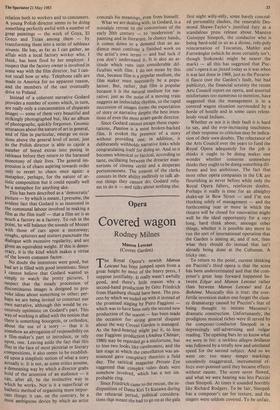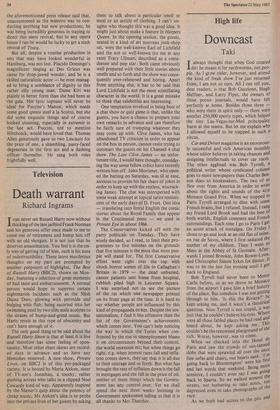Opera
Covered wagon
Rodney Milnes
Manon Lescaut (Covent Garden)
The Royal Opera's newish Manon Lescaut has been jumped upon from a great height by most of the heavy press, I suppose justifiably. It really wasn't awfully good, and there's little reason why a second-hand production by GOtz Friedrich from Hamburg should have been. The pro- cess by which we ended up with it instead of the promised staging by Piero Faggioni which was to have been only the second new production of the season — has been made the occasion for airing general disquiet about the way Covent Garden is managed. As the hard-hearted might put it, to lose one Faggioni production (Andrea Chenier, 1980) may be regarded as a misfortune, but to lose two looks like carelessness, and the late stage at which the cancellation was an- nounced gave conspiracy theorists a field day. The satirical magazine Private Eye suggested that complex video deals were somehow involved, which has a not im- probable ring.
Since Friedrich came to the rescue, the in- disposition of Dame Kiri Te Kanawa during the rehearsal period, political considera- tions that meant she had to go on at the gala first night willy-nilly, some barely conceal- ed personality clashes, the venerable Des- mond Shawe-Taylor's justified fury at a scandalous press release about Maestro Guiseppe Sinopoli, the conductor who is being hard-sold to us as a divine, roly-poly reincarnation of Toscanini, Mahler and Furtwangler (which he most certainly isn't, though Stokowski might be nearer the mark) — all this has suggested that Puc- cini's opera is as jinxed today as it was when it was last done in 1968, just as the Pavarot- ti fiasco (not the Garden's fault, but bad publicity), the financial scrutiny the recent Arts Council report on opera, and assorted misfortunes too numerous to mention, have suggested that the management is in a covered wagon situation surrounded by a horde of hostile and in some cases relent- lessly vocal Indians.
Whether or not it is their fault it is hard to say, and the ever-increasing touchiness of their response to criticism may be indica- tion of their own doubts. The reluctance of the Arts Council over the years to fund the Royal Opera adequately for the job it thinks it ought to be doing makes one wonder whether someone somewhere thinks they ought to be doing something dif- ferent and less ambitious. The fact that most other opera companies in the UK are flourishing as never before while only the Royal Opera falters, reinforces doubts. Perhaps it really is time for an almighty shake-up in Bow Street — and I'm not thinking solely of management — and the forthcoming year or more in which the theatre will be closed for renovation might well be the ideal opportunity for a very long, hard think about, amongst other things, whether it is possible any more to run the sort of international operation that the Garden is aiming at, and if not, then what they should do instead that isn't already being done at the Coliseum. A tricky one.
To return to the point, current thinking on Puccini's third opera is that the score has been underestimated and that the com- poser's great leap forward happened be- tween Edgar and Marron Lescaut rather than between Manon Lescaut and La Boheme. Musically this is true: the ever- fertile invention makes one forget the clum- sy dramaturgy caused by Puccini's fear of being thought to imitate Massenet's dramatic construction. Unfortunately, the prodigious musical riches were ill served by the composer/conductor Sinopoli in a depressingly self-advertising and vulgar reading. The opening bars let us know what we were in for: a reckless allegro brillante was followed by a totally new and unrelated speed for the second subject. And so we went on: too many tempo markings senselessly exaggerated, instrumental ef- fects over-pointed until they became effects without causes. The score never flowed, and what we were hearing was less Puccini than Sinopoli. At times it sounded horribly like Richard Rodgers. To be fair, Sinopoli has a composer's ear for texture, and the singers were seldom covered. To be unfair, the aforementioned press release said that, unaccustomed as the maestro was to con- ducting anything but new productions, he was being incredibly generous in staying to direct this mere revival, but in any opera house I ran he would be lucky to get a sixth revival of Tosca.
But all, despite a routine production in sets that may have looked wonderful in Hamburg, was not lost. Placido Domingo's magnificent singing as Des Grieux was cause for drop-jawed wonder, and he is a skilled naturalistic actor — he even manag- ed to bring a semblance of dignity to this rather silly young man. Dame Kiri was plainly in better form than she had been at the gala. Her lyric soprano will never be ideal for Puccini's Manon, which needs some good spinto steel a la Scotto, but she did some exquisite things and of course looked stunning, especially in extremis in the last act. Puccini, not to mention .Hitchcock, would have loved that. Thomas Allen generously gave us two Lescauts for the price of one, a shambling, pasty-faced degenerate in the first act and a dashing officer thereafter. He sang both roles frightfully well.











































 Previous page
Previous page